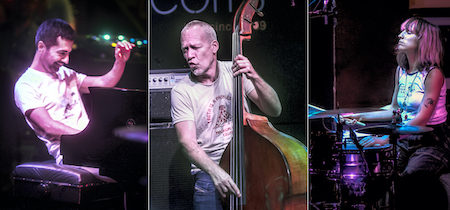Jan 13, 2026 2:09 PM
More Trump-Kennedy Center Cancellations
The fallout from the renaming of the John F. Kennedy Center for the Performing Arts to include President Donald…

The Avishai Cohen Trio, from left: Elchin Shirinov, Cohen and Roni Kaspi.
(Photo: Michael Jackson)Ronnie Scott’s, at the epicenter of swinging London’s Soho, is one of the world’s legendary music rooms. Sonny Rollins rolled out of a black cab blowing tenor as he waltzed into the club back in the ’60s; Roland Kirk handed out snuff to the audience after one of his always unforgettable appearances; all the legends have played there, from Mingus to Miles, Tubby (Hayes) and (Stan) Tracey.
Bass ace Avishai Cohen convened his new trio there back in August, and for his second set of the evening suggested, “Tell your friends and come back tomorrow night. Hold on, don’t come tomorrow night, because it’s sold out, too!”
Ronnie’s, it has to be said, though, is often sold out. Like Chicago’s Green Mill, it is a jazz joint that attracts non-jazz aficionados, a scene where it’s hep to be seen. The after-hours sets there these days at Ronnie’s can be quite raucous and participatory.
Cohen, however, made few concessions, didn’t announce any of the tunes and let the music do the talking. Retrieving a set list from the stage after the show was the only way this scribe could sharpen guesses about the selections. First off was an oldie, “Seattle,” the benign opening track from one of Cohen’s 2008 album Gently Disturbed (Razdaz), recorded with his then trio with drummer Marc Guiliana and pianist Shai Maestro. “Seattle” hovers across bar lines in 3/4. As with many of the bassist’s compositions, the “one” is eluded and there is a floating quality. “The Window,” which followed, was a choppy workout in 11 for outstanding 22-year-old Israeli drummer Roni Kaspi, whom Cohen met online during the pandemic. A moment during “The Window” afforded Azerbaijani pianist Elchin Shirinov an opportunity to cut loose from the metronomic pulse and swing more jazzily, but later in the set he was pinioned by a stabbing ostinato on “Seven Seas,” the eponymous cut from Cohen’s 2011 sophomore Blue Note release. Shirinov resolutely held the hard-to-count beat in seven for what seemed like forever, as Kaspi tore it up with double-time clickety-clack and resourceful breakbeat thuds and thumps.
Relentlessness and urgency are frequently to the fore in Cohen’s aesthetic, plus an ironclad adherence to the vamp that bespoke his rock influences (originally a pianist, he played bass guitar in an army band during Israeli national service in the ’80s). His International Vamp Band of yore made a manifesto of such, and like early M-BASE experiments, the rhythmic focus is admirable but can enervate. Cohen’s always buoyant, often drivingly contrapuntal compositional style became apparent on his auspicious 1998 debut, Adama (Stretch). Released during his tenure with Chick Corea’s stellar Origin group, co-founded by Cohen, Adama also features another formative Latin influence, Danilo Pérez (Cohen appeared on Pérez’s Panamonk). Lessons learned from contrabass predecessors Jaco Pastorius, Stanley Clarke, Mingus and Andy Gonzalez have lent Cohen a monumental presence on his instrument, and some of the more exciting moments listening to him occur when he cuts loose from power pendulum duties and extemporizes. This was first evident on his “Bass Suites” from Adama and came to the fore at Ronnie’s with arco mastery and other textures on “Joy” and “Cha Cha Rom.” The second of those outings was the preferable, the first rather over-controlled exultation, despite rambunctious drumming from Kaspi.
Shirinov has a thorough command of the ornaments of Middle Eastern music and the Sephardic traditions that are part of Cohen’s eclectic ancestry, and with his succinct playing and dependable, uncluttered time-keeping, it’s easy to see why the leader digs him. His origins are entrenched in Azerbaijani Maquam (modal folk-music) traditions, so he can sit on a groove with more patience and resolve than the average squirrelly jazzer. “Shifting Sands” (probably the most accurate title yet for the shimmering content of Cohen’s music) was recorded in August 2021 in Sweden, a downsizing from the lugubrious majesty of its predecessor “Two Roses,” captured (with Guiliana and Shirinov) alongside the colossal Gothenburg Symphony Orchestra in November 2020.
Cohen is a musician’s musician but has the capacity to render broader themes. The reprisal of his vocals on “When I’m Falling” on Two Roses reminded of his occasional ability to articulate the ineffable, and underscore his dictate about the essential “uplift” of music (as he wrote in liners to his 1999 album Devotion): “Those moments … when you feel as if something is filling you up with love and it feels like you want to stay there forever.” DB

Belá Fleck during an interview with Fredrika Whitfield on CNN.
Jan 13, 2026 2:09 PM
The fallout from the renaming of the John F. Kennedy Center for the Performing Arts to include President Donald…

Peplowski first came to prominence in legacy swing bands, including the final iteration of the Benny Goodman Orchestra, before beginning a solo career in the late 1980s.
Feb 3, 2026 12:10 AM
Ken Peplowski, a clarinetist and tenor saxophonist who straddled the worlds of traditional and modern jazz, died Feb. 2…

The success of Oregon’s first album, 1971’s Music Of Another Present Era, allowed Towner to establish a solo career.
Jan 19, 2026 5:02 PM
Ralph Towner, a guitarist and composer who blended multiple genres, including jazz — and throughout them all remained…

Rico’s Anti-Microbial Instrument Swab
Jan 19, 2026 2:48 PM
With this year’s NAMM Show right around the corner, we can look forward to plenty of new and innovative instruments…

Richie Beirach was particularly renowned for his approach to chromatic harmony, which he used to improvise reharmonizations of originals and standards.
Jan 27, 2026 11:19 AM
Richie Beirach, a pianist and composer who channeled a knowledge of modern classical music into his jazz practice,…